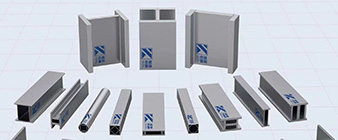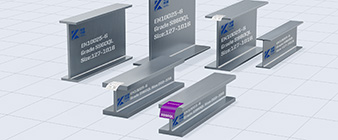Titanium Grade 7 (Ti Gr 7 / 3.7235 / UNS R52400) Laser welding is a very effective method of joining this corrosion-resistant alloy, especially in applications where precision and strength are critical. The following is an overview of the Titanium Grade 7 laser welding process, benefits, challenges and considerations.
Preparation:
Surface Cleaning: Make sure the surface to be welded is clean and free of contaminants such as oil, dirt and oxides, as titanium is sensitive to contamination.
Assembly: Proper alignment of components is critical to achieving a quality weld.
Welding parameters:
Laser Type: Nd: Fiber lasers are commonly used due to their high intensity and focusability.
Power setting: Adjust the laser power according to the thickness of the material. Thicker sections may require higher power settings.
Speed Control: Welding speed needs to be optimized to prevent overheating or undercutting.
Shielding gas: Use of Inert Gases: Argon or helium are often used as shielding gases to protect the weld pool from atmospheric contamination during the welding process.
Cooling: Controlled Cooling: Allowing a controlled cooling rate helps prevent deformation and cracking due to rapid changes in temperature.
Precision and Control: The high precision of laser welding and the ability to perform complex welds with minimal heat input are crucial for Titanium Grade 7.
Maintain intensity: The concentrated heat of laser welding minimizes the heat-affected zone (HAZ), reducing the risk of deformation and maintaining the integrity of the surrounding material.
Fast welding speed: The process is faster than traditional welding methods, increasing productivity in manufacturing environments.
Excellent welding quality: Produces high-quality welds with good mechanical properties for demanding applications.
Material Sensitivity: Titanium is sensitive to contamination and can absorb gases during the welding process, causing embrittlement. Proper cleaning and shielding are critical.
Thermal Management:
Heat input needs to be carefully managed to avoid problems such as warping or cracking, especially in thicker sections.
Chemical processing equipment: joining parts in corrosive environments.
Aerospace Structures: Making lightweight and strong parts.
Marine applications: Welded components exposed to harsh marine conditions.
Laser welding of Titanium Grade 7 offers many advantages, especially in applications requiring high precision and corrosion resistance. Although the process presents some challenges, proper techniques and considerations can lead to successful manufacturing results.
If you have more specific questions or need more detailed information, please feel free to ask Peak Kong Special Steel!
-
 2024-9-19 1.4539 stainless steel hollow structural profile
2024-9-19 1.4539 stainless steel hollow structural profile -
 2024-9-20 Application of Ti Gr 7/3.7235/UNS R52400 Structural Hollow Stations
2024-9-20 Application of Ti Gr 7/3.7235/UNS R52400 Structural Hollow Stations -
 2024-9-25 SMO254 Super Stainless Steel for Structural Applications
2024-9-25 SMO254 Super Stainless Steel for Structural Applications -
 2024-7-10 S960Q/S960QL/S960QL1 Steel: A Comprehensive Guide
2024-7-10 S960Q/S960QL/S960QL1 Steel: A Comprehensive Guide -
 2024-9-16 What are the typical applications of 316 stainless steel and EN 1.4401 stainless steel?
2024-9-16 What are the typical applications of 316 stainless steel and EN 1.4401 stainless steel? -
 2024-9-24 1.4401 stainless steel H-beams, I-beams, channel steels, angle steels
2024-9-24 1.4401 stainless steel H-beams, I-beams, channel steels, angle steels -
 2023-12-12 S690 QL/S690 QL1 high strength structural steel
2023-12-12 S690 QL/S690 QL1 high strength structural steel



